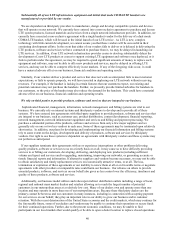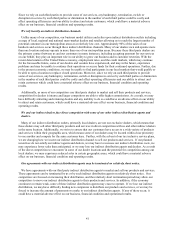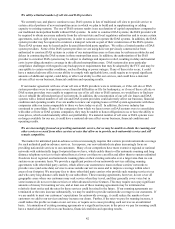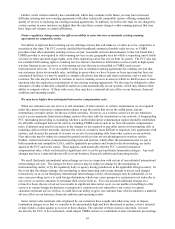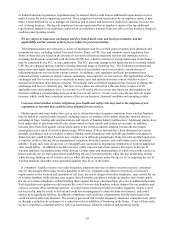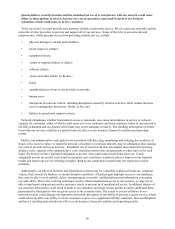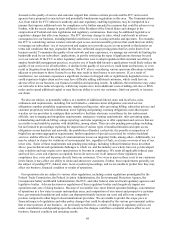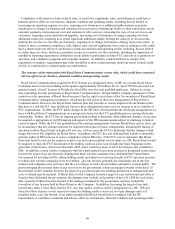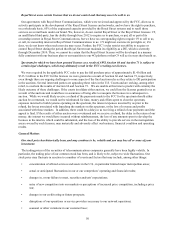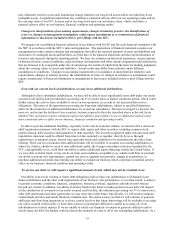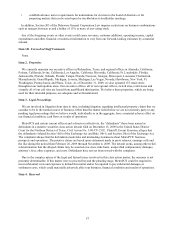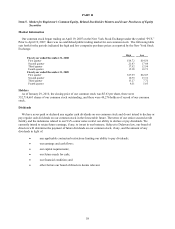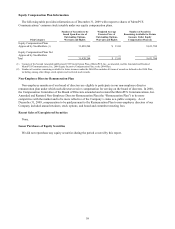Metro PCS 2009 Annual Report Download - page 61
Download and view the complete annual report
Please find page 61 of the 2009 Metro PCS annual report below. You can navigate through the pages in the report by either clicking on the pages listed below, or by using the keyword search tool below to find specific information within the annual report.49
Compliance with current or future federal, state, or local laws, regulations, rules, and ordinances could have a
material adverse effect on our business, financial condition and operating results, including but not limited to,
increasing our operating expenses or costs, requiring us to obtain new or additional authorizations or permits,
requiring us to change our business and customer service processes, limiting our ability to attract and retain certain
customer segments, increasing our costs and expenses to offer services, increasing the costs of our services to our
customers, requiring system and network upgrades, increasing cost of insurance coverage, requiring us to hire
additional employees, requiring us to spend significant additional capital, limiting the capacity of our networks,
limiting the services we can offer our customers, requiring us to change our business strategy and service plans. A
failure to meet, or maintain compliance with, federal, state or local regulations, laws, rules or ordinances also could
have a material adverse effect on our business, financial condition and operating results, including, but not limited
to, subjecting us to fines, forfeitures, penalties, license revocations, or other sanctions, including the imposition of
mandatory reporting requirements, limitations on our ability to participate in future FCC auctions or acquisitions of
spectrum, and compliance programs and corporate monitors. In addition, a material failure to comply with
regulations or statutory requirements may limit our ability to draw certain amounts under our senior secured credit
facility or could result in a default under our indebtedness.
The structure of the transaction with Royal Street Communications creates risks, which could have a material
adverse effect on our business, financial condition and operating results.
Royal Street Communications acquired its PCS licenses as a designated entity, or DE. As a result, Royal Street
Communications received a bidding credit equal to approximately $94 million for its “open” PCS licenses and was
granted certain “closed” licenses in Florida for which DEs were the only qualified applicants. Subject to certain
non-controlling investor protections in Royal Street Communications’ limited liability company agreement, C9 has
control over the operations of Royal Street because it has the right to elect three of the five members of Royal Street
Communications’ management committee, which has the full power to direct the management of Royal Street
Communications. However, the Royal Street business plan may become so closely aligned with our business plan
that there is a risk the FCC may find Royal Street to have relinquished control over its licenses to us in violation of
FCC requirements. In 2006, the FCC made changes to the DE rules, which preclude the wholesale arrangements we
have with Royal Street Communications on a prospective basis, but the FCC grandfathered our existing wholesale
relationship. Further, the FCC has an ongoing proceeding seeking to determine what additional changes, if any, may
be required or appropriate to its DE program and aspects of the DE program remain subject to challenge in federal
courts of appeal. While the FCC has grandfathered the existing arrangements between Royal Street and us, there can
be no assurance that any changes that may be required with respect to those arrangements, including the leasing of
spectrum to allow Royal Street to deploy 4G services, will not cause the FCC to determine that the changes would
trigger the loss of DE eligibility for Royal Street. In addition, the FCC has also indicated that it plans to undertake
periodic audits of DE licensees to assure compliance with its DE rules. If the FCC were to determine that Royal
Street has failed to exercise the requisite control over its licenses and thus lost its status as a DE, Royal Street would
be required to repay the FCC the amount of the bidding credit on a five-year straight-line basis beginning on the
grant date of the license, which was December 2005, and it could lose some or all of the licenses only available to
DEs. In addition, certain wireless companies who have participated in spectrum auctions as designated entities have
become the target of qui tam lawsuits claiming that those wireless companies have defrauded the United States
Government by investing in DEs, taking bidding credits and otherwise receiving benefits in FCC spectrum auctions
to which such wireless companies were not entitled. Qui tam lawsuits generally are filed under seal in the first
instance and companies may not know that they are a target of such a lawsuit unless and until it is made public. The
person bringing the suit may share in any recovery by the government, which encourages lawsuits of this kind. If
Royal Street or the Company becomes the target of a qui tam lawsuit, the resulting distraction to management and
costs to defend may be material. If Royal Street or the Company become a target of a qui tam lawsuit and either is
found to have defrauded the government, the damages may include civil penalties of up to $11,000 for each claim,
plus a penalty of three times the amount of the damages sustained by the government, and may include the
revocation of any licenses held by Royal Street or the Company. In addition, becoming the target of any such
lawsuit may make it more likely that the FCC also may audit a wireless carrier’s designation as a DE. If Royal
Street lost those licenses or was required to repay the bidding credits it received, or to pay damages and civil
penalties under a qui tam lawsuit, or an audit concluded that Royal Street had not complied with the DE
requirements, it could have a material and adverse effect on our business, financial condition and operating results.



